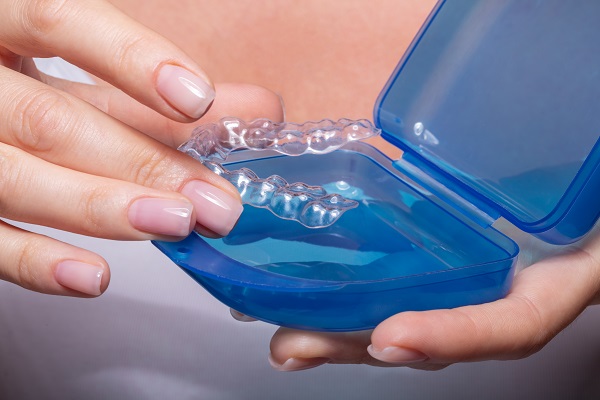When Does a General Dentist Recommend a Night Guard?

During one of your routine appointments, the general dentist may have suggested getting a night guard. Also known as an occlusal guard, a night guard is a removable custom-fitted oral device that fits in between the upper and lower teeth. The device prevents you from grinding or clenching your jaw, as well as repositioning your lower jaw during sleep. Continue reading to find out why you might be recommended for this device.
Who needs a night guard?
Teeth grinding during sleep is one of the most common reasons why general dentists fit their patients with a night guard. The action can cause severe jaw pain, teeth damages and tension headaches. Clinically called bruxism, nighttime teeth grinding can remain undetected for many months. The grinding process pits the upper and lower teeth against each other, gradually wearing the tooth's enamel and causing cracks and chips.
Temporomandibular joint (TMJ) disorder is another common issue that happens due to excessive teeth grinding. Patients with this disorder may experience chronic pain around the jaw, neck and face, as well as headaches. Teeth grinding has been associated with sleep disorders like sleep apnea and insomnia, which are detrimental to general wellbeing. The grinding action happens unconsciously and involuntarily. During a dental exam, the dentist may discover signs of teeth deterioration.
The dentist will prescribe an oral device called a night guard to mitigate the damaging effects of teeth grinding during sleep. The device is a safe and effective method to protect the teeth. It serves as a cushion between the upper and lower teeth and prevents unnecessary jaw shifting during sleep.
A device for sleep apnea
Aside from the protection against teeth grinding, a night guard can also be used to correct sleep apnea issues. Wearing the mouthguard moves the lower jaw forward, frees up tight jaw muscles and prevents the soft tissues of the mouth from collapsing into the airway and blocking breathing. This dental device is often used for cases of obstructive sleep apnea, especially when the patient cannot tolerate the CPAP machine. Otherwise, it can be a complementary treatment to improve the effectiveness of the CPAP device.
Getting the mouthguard
If the general dentist decides that a patient needs to get the night guard, they will customize the device to meet the specific need. They will take dental molds or impressions and send them to the dental laboratory that will produce the guard. The device's design will be adjusted so that patients can sleep and breathe comfortably with the device.
Besides relieving pain and disruptive sleep, a night guard from the general dentist can help prevent costly dental restoration procedures. Severe cases of teeth grinding can cause lasting damage to the teeth and necessitate the placement of dental crowns – if the tooth cannot be saved, an extraction might be necessary.
Final note
After getting the night guard, you should soon start to see the difference in how you wake up each morning. The general dentist can fit you with the appropriate oral device to keep your smile and health in good shape. Get started by booking a consultation appointment.
Request an appointment here: https://www.gablesexceptionaldentistry.com or call Gables Exceptional Dentistry at (305) 203-4132 for an appointment in our Coral Gables office.
Check out what others are saying about our dental services on Yelp: Night Guard in Coral Gables, FL.
Related Posts
People who grind their teeth when sleeping can benefit from wearing a night guard. These oral appliances can help to prevent the jaw pain, chronic headaches and damage to teeth that can occur as a result of teeth grinding.Formerly termed bruxism, teeth grinding occurs when a person moves their jaw back and forth during sleep.…
Bruxism, or teeth grinding, is a very common disorder. Left unchecked, it can lead to many serious health concerns. Those suffering from bruxism often have many questions about the condition before visiting a dentist.These disorders are often confused because they are closely related. Bruxism specifically refers to the grinding of teeth. TMJ is a disorder…
Also called a mouthguard, a night guard is used to protect the teeth from the impacts of grinding or clenching during sleep, and from damage when playing sports. They are also effective for snoring and obstructive sleep apnea.It may be hard to fathom how a plastic material can stop the pain and damages caused by…
A mouth guard is a valuable tool for protecting oral health. Many individuals may benefit from wearing one. Some people use it to prevent injury while participating in contact sports, while others wear one at night to manage conditions such as teeth grinding and sleep apnea. Understanding when to ask the dentist for a mouth…
